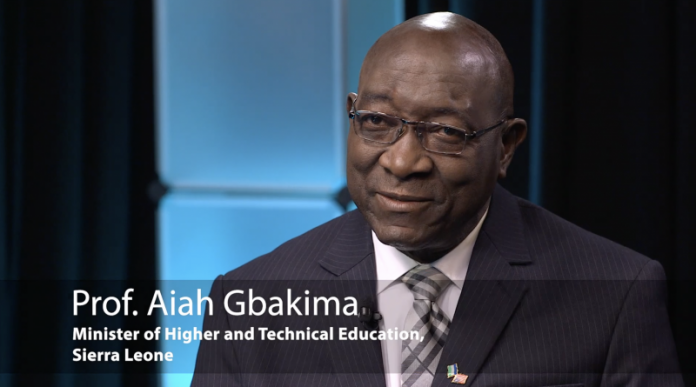On the 4th and 5th of July 2019 in the Eastern City of Kenema, major public education stakeholders in Sierra Leone converged to identify and discuss progress and challenges faced by public tertiary institutions over the last one year.
At the stocktaking retreat organized by the one year old Ministry of Technical and Higher Education (MTHE), various universities, colleges and polytechnics made presentations bordering on the status of their institutions in line with an eighteen-point terms of reference given to them by the Ministry.
Representatives from the University of Sierra Leone, Njala University, Milton Margai College of Education and Technology, Freetown Teachers College, EBK University and Eastern Polytechnic were unanimous in showering accolades on the current leadership of the higher education Ministry.
According to the higher and technical education administrators, they had not enjoyed a cordial relationship based on mutual respect and trust in the past as they do with the current dispensation.
While funding remains a major challenge across the board, the tertiary institutions have managed to make significant progress in debt management, staff welfare, infrastructural development and digital migration, using internally generated funds and government subventions.
Delivering his keynote address, the Minister of Technical and Higher Education, Prof. Aiah Gbakima described the gathering as a unique opportunity for education stakeholders to discuss the past, present and future of technical and higher education in the country.
He emphasized the need for admission into the universities to be strictly based on merit and for registration to be done online.
He said staff and students discipline could enhance professionalism and support a conducive learning environment.
He also spoke of the need to speedily review outdated academic curricula.
According to him, the retreat was meant to review the status of the tertiary institutions in line with an eighteen-point activity plan given to them about a year ago.
Minister Gbakima announced that the University Act is being reviewed.
The Minister urged Njala University to return to proper agriculture system including the introduction of college farms.
He called on the universities to put in place a system that will discourage delay in issuance of certificates.
The Deputy Minister of Technical and Higher Education, Dr.Turad Senesie disclosed that the rationale for the retreat was to review progress, identify gaps, and map out the way forward for the various institutions.
The retreat, he said, was also meant to identify and learn from administrative best practices among the institutions.
He reiterated President Bio’s passion for education, especially with regards to improvement of middle level human resource.
He bemoaned the status of institutions that are not producing the required output and urged them to take realistic steps to enhance standards.
Tertiary Education Commission’s (TEC) Prof. Algalie used the forum as an opportunity to refresh memories of the participants about the roles of TEC, which include registration of tertiary education institutions, approval of programs, quality assurance, and payroll management for public institutions among others.
TEC, he said, has successfully revised the TEC Act and Regulations, initiate process for accreditation of five universities, engaged teaching service commission on payroll management and midwifed the revised University Act.
He mentioned issues of recruitment of executive and adminstrative staff, and conditions of services as major challenges faced by TEC.
Presenting on behalf of the University of Sierra Leone, Prof. Foday Sahr said a strategic plan spanning 2019-2023 has been developed.
An ICT Directorate, according to him, has been established with competent personnel.
The University has established an ICT portal for online registration, he said.
According to him, the curricula has been reviewed in line with the job market.
“The University is currently rehabilitating existing structures and constructing new ones,” he said.
Prof Sahr disclosed that Students Union elections have been successfully conducted for IPAM and COMAHS, with FBC pending.
He furthered that the University has installed CCTV cameras in all examination halls.
“There is prudent fiscal management at all levels,” he assured.
Principal of Njala University, Prof. Abdullah Mansaray disclosed that his administration inherited a huge financial liability.
He reported that Njala has been able to largely fulfil all the eighteen points terms of reference with the exception of payments of outstanding end of service benefits and ex- gratis.
Njala, he said, has discovered a near-extinct plant species.
He pointed out that work for the completion of the new school of education building at Bo campus has commenced, adding that hostels, laboratories and faculties have been rehabilitated.
He said funding has been a major challenge, in addition to inadequate lecture facilities and offices for staff.
Prof. Momoh of the EBK University highlighted several gains made by his institution over the last one year, including digital migration, prudent financial management, capacitating staff and students’ discipline.
Dr. Philip Kanu of MMCET displayed in a PowerPoint presentation dilapidated structures his administration inherited and how much progress has been made to transform the institution.
Major rehabilitation works have been done on infrastructure and two staff bus and students’ bus have been purchased using internally generated funds and support from government.
Prof. Lahai and Dr. Samba Moriba presented progress made and challenges faced by the Eastern Polytechnic, while the FTC also made a presentation capturing gains and challenges.
The retreat ended with discussions on best practices on prudent financial management, digital migration and quality assurance among others.




